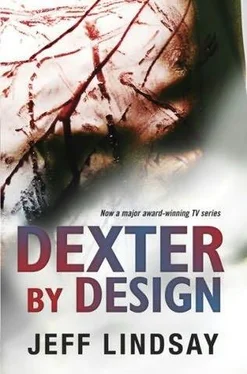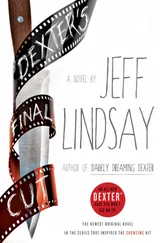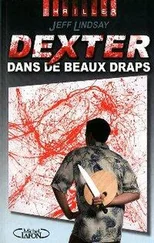By the time I got back to my little cubby at headquarters I had sweated away most of my artificial human covering and I wanted nothing more out of life than to take a shower, put on some dry clothes, and then possibly slice up somebody who thoroughly deserved it. Of course, that led my slowly chugging train of thought straight down the track to Weiss, and with nothing else to do except admire the feel and smell of my own sweat, I checked his YouTube page one more time.
And this time there was a brand new thumbnail waiting for me at the bottom of the page.
It was labeled, “Dexterama!” There wasn't any realistic choice in the matter. I clicked on the box.
There was an unfocused blur, and then the sound of trumpets that led into noble-sounding music that reminded me of high school graduation. Then a series of pictures; the “New Miami” bodies, intercut with reaction shots from people seeing them, as Weiss's voice came in, sounding like a wicked version of a newsreel announcer.
“For thousands of years” he intoned, “terrible things have happened to us ...” and there were some close-up shots of the bodies and their plastic-masked faces. “And man has asked the same question: why am I here? For all that time, the answer has been the same ...” A close-up of a face from the crowd at Fairchild Gardens, looking puzzled, confused, uncertain, and Weiss's voice coming over it in dopey tones. I dunno ...” The film technique was very clumsy, nothing at all like the earlier stuff, and I tried not to be too critical —after all, Weiss's talents were in another area, and he had lost his two partners who were good at editing.
“So man has turned to art” Weiss said with artificially solemn breathlessness, and there was a picture of a statue with no arms and legs. “And art has given us a much better answer ...” Close-up of the jogger finding the body on South Beach, followed by Weiss's famous scream.
“But conventional art can only take us so far” he said. “Because using traditional methods like paint and stone create a barrier between the artistic event and the experience of art. And as artists we have to be all about breaking down barriers.” Picture of the Berlin Wall falling as a crowd cheers.
“So, guys like Chris Burden and David Neruda began to experiment and make themselves the art —one barrier down! But it's not enough, because to the average audience member” another dopey face from the crowd, “there's no difference between a lump of clay and some crazy artist; the barrier is still there! Bummer!” Then Weiss's face came on screen; the camera jiggled a little, as if he was positioning the camera as he talked. “We need to get more immediate. We need to make the audience part of the event, so the barrier disappears. And we need better answers to the bigger questions. Questions like, “What is truth? What is the threshold of human agony? And most important...” and here the screen showed that awful loop of Dexter Dumping Doncevic into the white porcelain tub, “what would Dexter do —if he became part of the art, instead of being the artist?” Here there was a new scream —it was muffled, but it sounded tantalizingly familiar; not Weiss's, but something I had heard before, although I couldn't place it, and Weiss was back on screen, smiling slightly and glancing over his shoulder. “At least we can answer that last one, can't we?” he said. And he picked up the camera, twirled it around off his face and onto a twitching heap in the background. The heap swam into focus and I realized why the scream had sounded familiar.
It was Rita.
She lay on her side with her hands tied behind her and her feet bound at the ankles. She squirmed furiously and made another loud and muffled sound, this time one of outrage.
Weiss laughed. “The audience is the art” he said. “And you're going to be my masterpiece, Dexter.” He smiled, and even though it was not an artificial smile, it was not particularly pretty, either. “It's going to be an absolute ... art-stravaganza” he said. And then the screen went dark.
He had Rita —and I know very well that I should have leapt up, grabbed my squirrel gun, and charged into the tall pine screaming a war cry —but I felt a curious calmness spread over me, and I simply sat there for a long moment, wondering how he'd taken her and what he would do to her, before I finally realized that, one way or another, I really did have to do something. And so I started to take a large breath to get me out of the chair and through the door.
But I had time for only one small breath, not even enough to get one foot on the floor, when a voice came from close behind me .
“That's your wife, right?” said Detective Coulter.
After I peeled myself from the ceiling I turned and faced him.
He stood just inside the door, several feet away, but close enough that he must have seen and heard everything. There was no way to dodge his question.
“Yes” I said. “That's Rita.” He nodded. “That looked like you, with the guy in the bathtub.”
“That, I...” I stammered. I don't think so.” Coulter nodded again. “That was you” he said. And since I had nothing to say and didn't want to hear myself stammer again, I just shook my head. “You going to just sit there, guy got your wife?” he said.
I was just about to get up” I said.
Coulter cocked his head to one side. “You get the feeling this guy doesn't like you or something?” he said.
“It's starting to look like that” I admitted.
“Why do you think that is?” he said.
I told you. I hurt his boyfriend” I said, which sounded very weak, even to me.
“Yeah, that's right” Coulter said. “The guy that disappeared. You still don't know where he went, do you?”
“No, I don't” I said.
“You don't” he said, cocking his head. “Because that wasn't him in the bathtub. And it wasn't you standing over him with a saw.”
“No, of course not.”
“But this guy maybe thinks it was, cuz it looks like you” he said, “so he took your wife. Kind of a trade thing, right?”
“Detective, I don't know where the boyfriend is, really” I said.
And it was true, considering tide, current, and the habits of marine scavengers.
“Huh” he said, and he put an expression on his face that I assumed was meant to look thoughtful. “So he just decides to, what? Make your wife into some kind of art, right? Because ...?”
“Because he's crazy?” I said hopefully. And that was true, too, but that didn't mean that Coulter would be impressed.
Apparently, he wasn't. “Uh-huh” he said, looking a little dubious. “He's crazy. That would make sense, right.” He nodded, like he was trying to convince himself. “Okay, so we got a crazy guy, and he's got your wife. And so what now?” He raised his eyebrows at me with a look that said he hoped I might come up with something really helpful.
I don't know” I said. I guess I should report this.”
“Report it” he said, nodding his head. “Like to the police. Because last time when you didn't do that I spoke harshly to you on the subject.”
Intelligence is generally praised as a good thing, but I really have to admit that I had liked Coulter a lot more when I thought he was a harmless idiot. Now that I knew he was not, I was caught between the urge to be very careful what I said to him and an equally powerful desire to break my chair over his head. But good chairs are expensive; caution won.
“Detective” I said. “This guy has my wife. Maybe you've never been married—”
“Twice” he said. “It didn't work.”
“Well, it works for me” I said. “I'd like to get her back in one piece.”
He stared at me for a very long moment before he finally said, “Who is this guy? I mean, you know.”
Читать дальше












